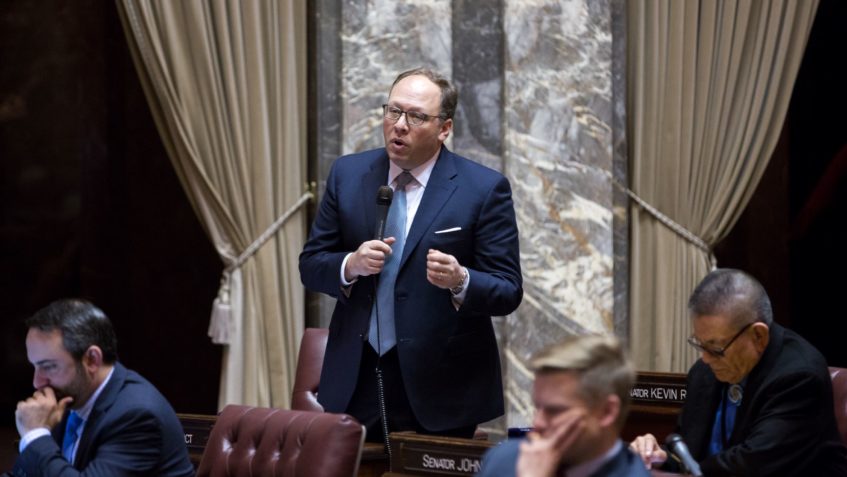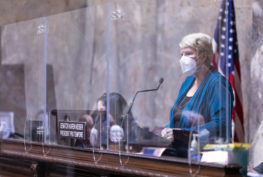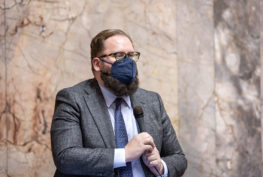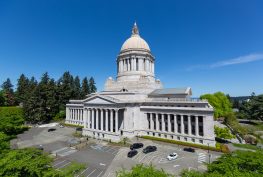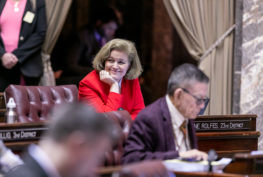OLYMPIA — The Senate today approved $6.3 billion in funding for priority infrastructure across the state, the largest and most aggressive capital construction budget in state history, funded through a combination state bonds, local revenue sources and federal relief funds.
The funds allocated by House Bill 1080 will go toward expanding broadband internet access, growing the state’s supply of affordable housing, improving behavioral health, safeguarding natural resources, and investing in underserved communities.
“The economic conditions are right to make investments in infrastructure that will jumpstart our economic recovery and provide long-term dividends for our economy for years to come,” said Sen. David Frockt (D-Seattle), vice chair of the Senate Ways & Means Committee and the Senate’s lead capital budget writer. “This budget reflects the input of communities across the state and will help build a stronger post-pandemic recovery with more jobs and opportunity across Washington.”
Expanding broadband internet access to rural and underserved areas throughout the state was one of the key recommendations that the Senate Special Committee on Economic Recovery, which Frockt chaired, identified in a January report. This budget fulfills that promise with an investment of $411 million.
“Broadband is no longer a luxury,” Frockt said. “Like electricity, it is a basic necessity. Everyone in Washington needs broadband to connect to education, jobs and opportunities. This investment will go a long way to expand high-speed internet to underserved communities.”
Addressing the homelessness crisis in Washington cities and towns was a top priority for Senator Frockt. The budget invests $350 million in affordable housing grants and loans, including $175 million for the Housing Trust Fund that builds affordable housing for the long term. The budget also establishes an innovative $120 million Rapid Housing Acquisition program to help Seattle, Tacoma and other locations around the state get unsheltered people into housing as quickly as possible. The goal is to help address the crises on the ground rapidly – not in two or four years – allowing localities assistance with the flexible solutions that might be appropriate for their community, whether its hotel or building acquisition, tiny homes, enhanced emergency shelter or transitional housing. Local and community projects supported by members of both parties, that help accomplish these goals across the state are also included in the proposal
The budget includes funds to improve the state’s environmental health, including $386 million for recreation, conservation, and salmon recovery projects as well as $745 million for clean-water efforts and toxics cleanup. The new Nisqually State Park will also receive significant funding for initial development as part of a $73 million overall investment in state parks.
“As we build back from the pandemic, our state construction projects are more important than ever,” said Sen. Mark Mullet (D-Issaquah), who is part of the capital budget-writing team. “The jobs and economic growth from these projects will put our local communities back on a path to grow and thrive.”
The budget demonstrates Democrats’ commitment to equity by investing significantly in underserved communities through broadband expansion, affordable housing, and community projects, including a new dedicated Community Relief Fund that invests $13.6 million in projects in underserved communities. Another $5 million goes to technical assistance grants to identify and support projects in underserved communities—both urban and rural—that may be good candidates for future capital funds.
Priority projects in communities that have historically been underserved, including communities of color, will receive significant funding, including $13.3 million for housing in Seattle, $7 million for low-income housing in Tacoma, $919,000 to purchase the historic Dr. Nettie Asberry House in Tacoma, and $4.5 million for the didgwalic Wellness Center in Anacortes in partnership with tribal governments.
Behavioral health facilities will receive $428 million, including $200.8 million for the University of Washington’s new Behavioral Health Teaching Facility. K-12 schools are in line for $930 million in construction funding, including $42 million in modernization grants for small districts and Tribal compact schools.
Finally, the budget makes historic investments in Washington’s higher education system, with an additional $531 million for four-year institutions and $512 million for community and technical colleges. That includes $45.4 million for the College of Engineering Interdisciplinary/Education Research Center at the University of Washington, $36 million for the Academic Innovation Building at the University of Washington-Tacoma, $52.6 million for the Life Sciences Building at Washington State University-Vancouver, $45 million for the first phase of the Science Building renovation at Eastern Washington University, $55.5 million for the Health Education Building at Central Washington University, $51 million for the Electrical Engineering/Computer Science Building at Western Washington University, and $30.5 million for library renovation at North Seattle College.
Highlights from investments in the 46th Legislative District and Seattle (Full details available online)
46th Legislative District
- $30.5 million for library renovation at North Seattle College
- $4 million for Bellwether Housing and Chief Seattle Club to develop affordable housing in north Seattle
- $2.5 million for Aurora Commons property acquisition to develop more housing and services over time
- $1.13 million for Magnuson Park Historic Hangar 2 renovation
- $900,000 for The Eli’s Park Project to create a community park in north Seattle accessible for all children
- $1.2 million for the City of Lake Forest Park’s acquisition of lakefront property to open up its shoreline for the public
- $927,000 for Squire’s Landing Park Waterfront & Open Space Access Project in Kenmore
Seattle
- $200.8 million for University of Washington’s new Behavioral Health Teaching Facility
- $45.4 million for the College of Engineering Interdisciplinary/Education Research Center at the University of Washington
- $2.3 million for the Chief Seattle Club
- $3 million for Sea Mar Community Health
- $2.7 million for White Center Community Development Association
- $5 million for acquisition of the Clay Apartments by the City of Seattle
- $4 million for Africatown Community Land Trust’s acquisition of the Keiro site
- $300,000 for acquisition of the Concord Apartments
- $2 million for the Seattle Aquarium Expansion on the Waterfront
- $7 million for Seattle Public Schools for expanding and renovating Green Lake Elementary
- $1.9 million for Seattle Public Library’s Renovations at its Green Lake Branch
- $100,000 for Green Lake Community Boathouse

